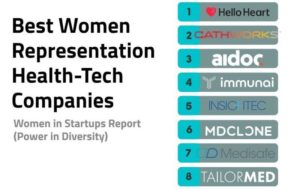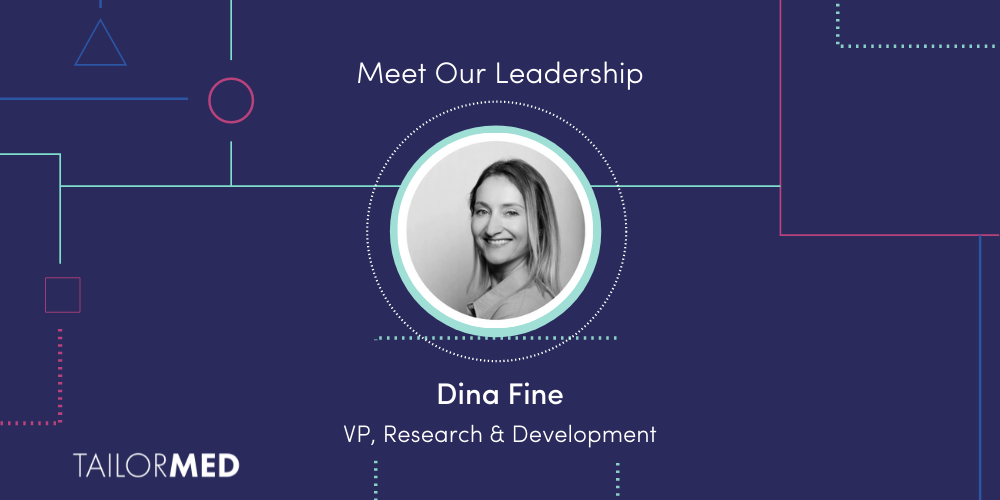Editor’s Note: Dina Fine, TailorMed’s VP of R&D, brings almost two decades of experience in building high-performance, scalable systems. She is passionate about leading fast-paced R&D departments and establishing effective development lifecycles—with a focus on technological excellence. We sat down with Dina to discuss her personal and professional journey, her advocacy for women in tech, and how TailorMed is harnessing the latest advancements to “move mountains for patients.”
TailorMed Editorial Team: Let’s start with your personal story. Tell us about your childhood, education, and journey into the field of software engineering and development.
Dina Fine: I was born in Siberia in a town called Irkutsk. As a kid, I was very curious and analytical. In the winter, I remember being fascinated by these huge snowflakes and wanting to understand their structure. Later, I would disassemble devices to find out what was inside, then try to put them back together. My family—especially my father, who was an engineer—encouraged me to learn and explore.
When I was 14, my family immigrated to Israel. I immediately loved the warm weather and beaches. In high school, I specialized in math, computer science, and physics. After my army service, I graduated with degrees in math and computer science from Tel Aviv University. The field of software engineering was a natural fit.
TM: You have nearly 20 years of experience in R&D. What motivated you to join TailorMed?
DF: Over the course of my career, I’ve had the opportunity to develop various technologies, mostly in the area of distributed file systems. I spent about eight years as a software engineer and then took on managerial roles, eventually leading teams around the world. But at some point, I realized that I wanted to join a company with a more direct impact on people’s lives. TailorMed is that company.
Around the time I learned about TailorMed, my father was diagnosed with brain cancer. I’ve experienced firsthand the difficulties families go through when a loved one receives a diagnosis like cancer. TailorMed’s mission to remove financial barriers to care inspires me every day.
TM: What is the primary role of R&D in helping TailorMed achieve its mission?
DF: TailorMed has an important vision of helping patients and healthcare organizations tackle the financial challenges of care delivery. Using cutting-edge technologies, the R&D team builds TailorMed’s platform and brings the company’s vision to life. In addition to building new products, our team develops solutions to improve our existing products, so that they will run better and faster. Our commitment to technological innovation and excellence ensures that TailorMed can best meet the needs of those we serve.
TM: What’s next for TailorMed in terms of harnessing the power of technology to tackle healthcare affordability?
DF: Artificial intelligence and machine learning hold tremendous potential for TailorMed. As we continue to grow, we’re gaining more valuable insights into the patient medical and financial journey. By harnessing new technologies, I believe we can learn from this data to build much smarter prediction algorithms.
Let’s say we have a breast cancer patient. Based on the information we’ve received from the healthcare provider, we know her age, her medication, and some details about her insurance coverage. However, we don’t have the full picture, such as when she started treatment, which dosages she received, and how many treatment cycles she needs. AI and machine learning can give us the tools to analyze the data we already have in our system, search for similar cases, and learn from them. We can then say, “What is the usual treatment cycle for this type of patient?” and accurately predict her medical journey and out-of-pocket costs. This will dramatically expand the number of patients we are able to help.
TM: We’ve seen a huge digital transformation in healthcare in recent years—and the pandemic has propelled health-tech innovation even further. What are some of the biggest opportunities and challenges in healthcare technology right now?
DF: Digital health solutions, such as virtual care, have taken off during the pandemic. In our era of healthcare consumerism, there’s now a push to create positive patient experiences by unlocking medicine’s “digital front door.” As costs of care continue to rise, healthcare organizations are recognizing that the financial experience is a critical component of the overall patient experience—especially with so many families struggling with pandemic-related economic challenges.
Technology holds the potential to improve the patient’s financial experience and help healthcare organizations address the serious revenue challenges brought about by the pandemic. Predictive analytics, for instance, can help providers and pharmacies proactively identify patients at risk of financial distress and secure the resources they need to afford care. At TailorMed, we’ve seen these tools play an instrumental role in reducing uncompensated care and bad debt.

TM: TailorMed was recently recognized by Power in Diversity as being one of the best health-tech companies for representation of women. How has the organization built a culture that supports and empowers women in tech—and why do you feel this is so important?
DF: Our culture fosters open conversation, encouraging each member of the team to express his or her point of view. This creates a healthy work environment in which everyone can thrive—including women. When women join the company, they see that we have a significant number of women in managerial positions. This representation shows new employees that we support and value women, giving them greater confidence to grow.
At TailorMed, we believe all forms of diversity are crucial. By having a diverse workforce, we bring many different perspectives to the table, enabling us to build a stronger company and better solutions for those we serve.
TM: In your experience, what are some of the biggest challenges for women in tech and how can technology companies help to dismantle some of these obstacles?
DF: One of the main obstacles for women in tech—and in many professions—is self-representation. When I interview women and men with similar skill sets, men tend to oversell their experience, while women often present their skills in a humbler way. I see this not only in interviews, but also in our day-to-day work. I believe this is one of the reasons men are promoted at higher rates than women. Managers should be aware of these differences, so as not to miss out on great talent, both for recruitment and leadership development. TailorMed recognizes these nuances as we seek to hire excellent candidates and nurture their potential.
TM: What do you find most rewarding about your day-to-day work and what excites you most about TailorMed’s future?
DF: No patient or family should have to choose between lifesaving treatment and financial stability. I find it extremely rewarding to be part of the solution to this urgent problem. At our offices in Tel Aviv, where the R&D team is based, we have monitors displaying the number of patients who have received financial assistance with the help of our system. I love watching this number rise and hearing success stories from our clients and partners.
Looking to the future, I’m excited to grow with TailorMed and with my team, as we embrace new technologies, take on new challenges, and help more patients access the care they deserve.
**


